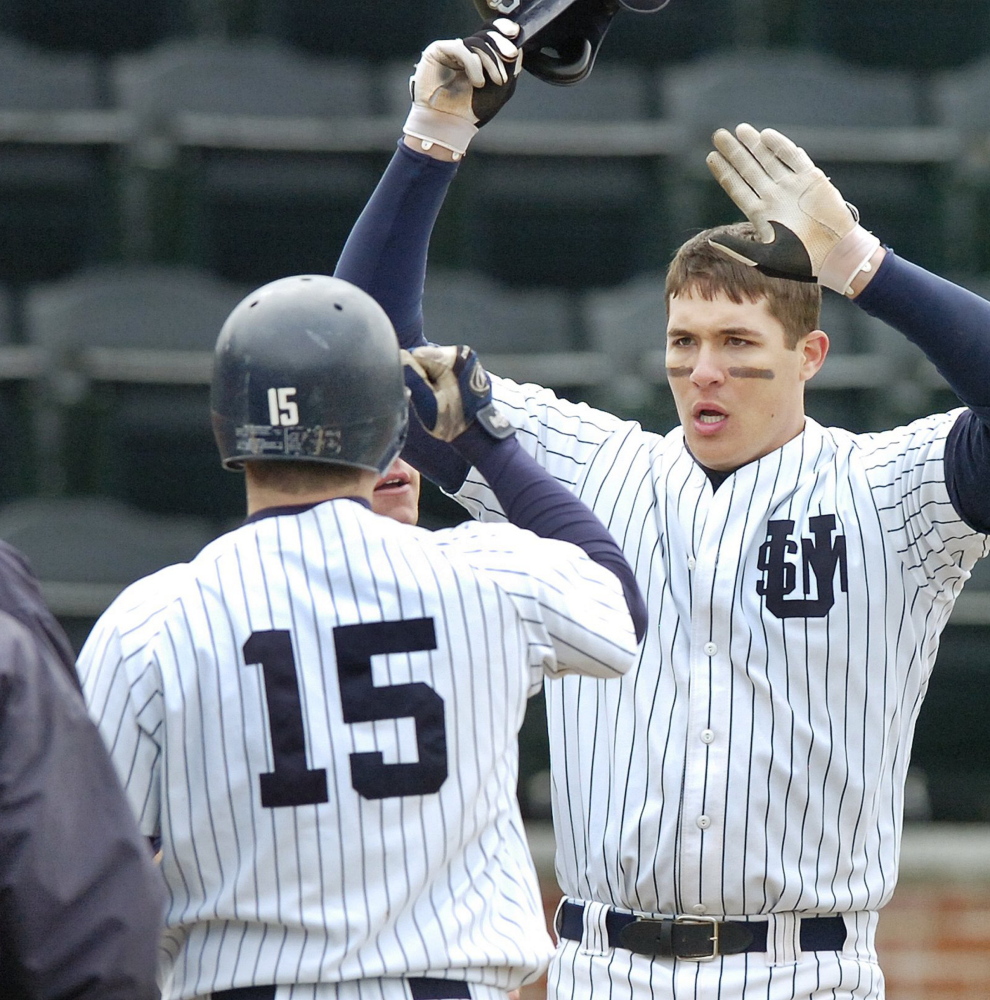The two men wearing police uniforms approached the new BMW with Maine license plates and the trio from Westbrook sitting inside. Behind the wheel, Angela Vanier stared at the large weapons in their hands.
They were deep inside Mexico and she was getting very nervous.
Her boyfriend sat in the passenger seat: Anthony D’Alfonso, a power-hitting outfielder who played for Westbrook High and the University of Southern Maine. His mother, Melissa, was in the back seat. Angela kept repeating “lo siento, no habla espanol” to the men in uniforms while wondering what, in the name of love and baseball, had they gotten themselves into.
Just another chapter in the adventure of their lives.
The three were on this road chasing Anthony’s dream of playing professional baseball. No major league team drafted him after his final season at USM in 2009. Two years later the San Luis de Colorado Algonderos of Liga Norte de Mexico offered him a roster spot.
Think Double-A minor league baseball in the U.S., maybe. Think of a dusty city of about 140,000 next to what’s left of a dried-up Colorado River in the Mexican state of Sonora.
Think of a small ballpark where the batter’s box and foul lines are made by a man shaking a tin can of lime at the end of a stick. The lines look perfect, by the way.
About 1,500 fans attend home games unless there’s a conflict with a major soccer game or fight card. All the anouncements, signage, programs and directions to rest rooms and concessions are in Spanish. Each of the six teams in the league can have up to five foreign players, but many have fewer. Anthony is one of a handful of Americans.
Pipeline to American baseball? A catcher named Humberto Cota once played for San Luis and was signed by the Atlanta Braves. That was about 20 years ago and that may be the entire list. Alfredo Aceves, who pitched for the Red Sox, is from San Luis.
Perhaps the city’s most famous athlete is former welterweight champ Carlos Palomino. Baseball? It ranks behind soccer and boxing. Then Anthony came into the lives of the people of San Luis.
At 6-foot-4, 240 pounds, he stands literally head and shoulders over nearly every teammate. He can light up the ballpark with his power hitting and big smile. He signs autographs when he arrives maybe four hours before a game and long after it’s played.
He is El Grande, the Big One. A teammate who pitched in America at the Triple-A level gave him another nickname: Donk. It was short for Big Donkey, and it was said with friendship and respect.
Anthony played a half season in 2011 and again in 2012, the year their car was stopped by men with badges. Angela had been following the team bus. She might have tried to explain that Anthony was a professional baseball player but didn’t.
Would that information make him a better prize for kidnappers?
THE START OF A SCRIPT
For Anthony and Angela, the past four years have been an unscripted story. This year Angela began a blog and called it “The Bitching Mound: Real life struggles of dating an aspiring baseball player.” It’s hilarious reading. In her dreams, Angela hopes it’s the beginning of a movie script.
“I thank Anthony every day for the misery he’s allowed me to share with him,” she says, laughing. She does admit this is the first year she’s truly understood the depth of Anthony’s passion for baseball.
She ditched her job as a financial advisor in Portland with its handsome salary to join Anthony in Yuma, Arizona, in 2011, less than a year after they met through friends in Portland.
At the time, Anthony had returned to Maine after a brief fling with the Yuma Scorpions of the independent Golden Baseball League. “It’s crazy how life turns,” he said in a 2010 Portland Press Herald story.
“One day I’m playing softball and dumping other people’s garbage, and the next minute I’m at a tryout and finally playing baseball again. It’s been a long, bumpy ride.”
And that was four years ago.
His tryout with the team in San Luis happened the next summer. He got the roster spot immediately and soon was crossing the border to play in Mexico.
Anthony and Angela’s first home was a 1980s-vintage RV in an Yuma RV park. Their arrival brought the average age of the neighborhood down to about 55. Money was tight. Melissa D’Alfonso, on one of her visits to watch her son play, left behind a credit card for emergency purposes. Anthony and Angela decided buying food was an emergency.
A QUICK-THINKING MOTHER
Melissa was even more helpful the night their car was stopped. Angela followed the team bus through an intersection when she saw flashing lights in her mirror. When the police realized no one in the car understood much Spanish, they switched to broken English.
They asked Anthony to get out of the car. Angela, imagining the worst, told him to stay where he was. The problem? She drove through a red light, they said. She knew she hadn’t and asked them to mail her the ticket. That approach didn’t work at all.
Melissa D’Alfonso leaned forward rubbing her fingers in the unmistakable gesture of money. Can we fix this?
Si, she was told. The fine could be paid right then. Melissa handed over a 1,000 peso note, her smallest bill after an ATM withdrawal. “That’s $100,” said Melissa, back in the Westbrook home she shares with her husband, Nick Sr.
“I learned later they probably would have let us go for 500 pesos.” said Melissa. Live and learn. Mama D, as Angela calls her with affection, has made trips to San Luis each of the four years Anthony has played there. She doesn’t speak Spanish, which hasn’t stopped her constant commentary on the game. Her voice can wake the dead: Fi-ya strikes!!! Her absence in the stands sitting with Angela is noticed before and after her visits from Maine.
“People know who we are,” said Melissa. “They go out of their way to speak what English they know to us. They’re very welcoming. Anthony is like a celebrity. He hollered ‘brutal’ once at a called strike. Now the fans holler ‘brutal.’ ”
THE MEXICAN EXPERIENCE
Last year Anthony played a full season, batting .330 and leading the Algodoneros to the championship. The series was played in the league’s best ballpark in Tijuana, where between 24,000 and 28,000 fans watched last July. Soon after, Anthony was in the lineup for the El Paso Diablos of the American Association Independent League, earning $800 a month and living in a Motel 6.
But Anthony was all but invisible to MLB scouts. Last fall, Anthony and Angela lived in Tucson, Arizona, more than three hours from San Luis. A graduate of American University in Washington, D.C., she got a job at a Verizon data-processing center.
Anthony worked in a credit-card call center in collections. He hated it and quit, telling Angela he believed he could still play baseball. Then Algodoneros ownership called, offering a raise to $2,000 a month. It was enough to keep his dream alive.
It was also enough to get an apartment within minutes of the ballpark in San Luis. The place is modest by Maine standards, but it has air conditioning and Internet access, and a full kitchen and bathroom – luxuries the RV never had.
Homeless men sleep outside the building. Angela gives them bottled water when she crosses the border for weekend series and stays with Anthony. She hopes they’ll protect the apartment.
With Mama D back in Maine, Angela is convinced she’s the only American in the ballpark stands. She sits with the wives and girlfriends now. “Google translator has really come in handy.”
She’s grown fond of respadas – shaved ice scooped out of a Coleman cooler and topped with your choice of syrup. She used to wonder how clean the cooler was before the ice shavings went in.
Papas are homemade potato chips doused in two types of chili sauce. Squeeze a slice of lime onto the sauce and chips. “It’s heaven on earth,” Angela says.
Anthony is at the ballpark for maybe seven hours at a time, including batting and fielding practice. So is Angela. An hour or so before the first pitch, he and his teammates visit a food vendor for the most authentic and freshest tacos he’s ever had.
The Mexican anthem is sung before games, the crowds are rowdy, inappropriate and unfiltered, says Angela. The mascots are insane. There’s a mix of Mexican music and American classics like “YMCA” and “We Will Rock You” between innings.
HOPING FOR A CHANCE
Anthony is having a monster season for San Luis, batting just under .400 and leading the league. He’s also the RBI leader and tied for the lead in home runs. He won the home run derby at the league all-star game last month.
“I didn’t really do it for me,” he said. “I did it for Angela.”
The league schedule is split into half-seasons. San Luis won the first half and is leading the second half going into the final games of the season. Anthony rolled his foot recently but expects to be ready for the playoffs.
He’s never given up hope.
“I can only do my best. Things happen for a reason but I know I’m just tapping my potential.”
If baseball hasn’t been kind to Anthony, beisbol certainly has.
At age 27, he does wonder if his window to play minor league ball in the U.S. is closing or closed. He has a contract to attend preseason training for Mexico’s Pacific League, a winter league. If his bat can win a roster spot, the pay is $5,000 a month, or more than double what he earns now.
More importantly, scouts from major league teams in Japan, Taiwan and South Korea will be in the stands. Anthony says he would gladly play in Asia.
He has driven a salvage truck, worked as a substitute teacher, as an instructor at baseball academies and, of course, that job talking to people with overdue credit-card bills.
Anthony is on LinkedIn, the Internet networking service. His online resume includes this: “The level of resiliency and amount of adversity I’ve faced is unparalled by your typical job applicant.”
He couldn’t be more right.
Send questions/comments to the editors.





